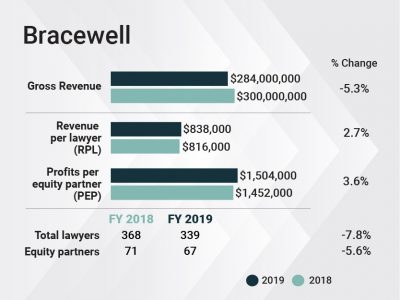Infrastructure Work Powered Bracewell into Record RPL and PEP
With a reduced head count, Houston-based Bracewell saw its revenue decline.
March 19, 2020 at 11:58 AM
4 minute read
 Gregory Bopp of Bracewell.
Gregory Bopp of Bracewell.
While Bracewell posted a 5.3% decline in revenue in 2019, the slimmed-down firm saw revenue per lawyer and profits per equity partner hit all-time highs.
The firm's gross revenue came in at $284 million for 2019, down 5.3% when compared with $300 million in 2018. But managing partner Gregory Bopp said revenue changed little on a year-to-year basis when accounting for a one-time windfall in 2018: a $20 million in contingency fee.
RPL was $838,000 in 2019, up 2.7% when compared with the prior year, but the firmwide head count of 339 lawyers was 7.8% lower than in 2018.
PEP was $1.50 million, up 3.6% when compared with $1.45 million last year. Net income totaled $100.7 million, down 2.2% from $103.1 million in 2018.
Bopp said was 2019 was an "excellent year" across the firm, pointing to the increases in RPL and PEP. He said energy and infrastructure and finance practices were busy throughout the entire year, as were the regulatory and litigation practices.
 "A lot of that is driven by the tremendous amount of energy and non-energy infrastructure work that was going on throughout North America," he said.
"A lot of that is driven by the tremendous amount of energy and non-energy infrastructure work that was going on throughout North America," he said.
Transactional lawyers were involved in many midstream projects—including pipelines—from the Permian Basin to the Gulf Coast, he said. Transactions include representing Kinder Morgan in the $1.56 billion sale of the U.S. portion of the Cochin Pipeline to Pembina Pipeline Corp., TC Energy Corp. in its $1.275 billion sale of U.S. midstream assets held by its subsidiary, Columbia Midstream Group, to a subsidiary of UGI Corp., and Apache Corp. in the sale of North Sea oil and gas assets to Chrysaor.
The firm also represents Kinder Morgan in litigation over construction of the Permian Highway Mountain pipeline; Apache in a number of oil and gas lawsuits; and the Archdiocese of New York in connection with allegations of sexual abuse.
Bopp said the firm's London office posted its best year ever. That office is focused solely on energy and infrastructure work, he said.
While a number of other firms said the slowdown of capital markets work in the energy sector affected demand, Bopp said Bracewell's energy practice is focused on the full spectrum of infrastructure development in the sector including permitting, regulatory, transactions, commercial contracts and litigation.
"The oil and gas-related capital markets work was not as robust in 2019, but the power and utility capital markets work for us was busier," he said.
Head count declined in 2019 at Bracewell primarily due to retirements and a number of departures for in-house positions. But the firm did lose some lawyers, including two renewable energy partners in Houston and New York who went to Sidley Austin, and a four-lawyer group that moved to Morgan, Lewis & Bockius in Dallas.
Bopp said the firm brought on 12 lateral partners in 2019, including four boomerangs—two intellectual property litigation partners in Austin, an energy projects partner in Dubai and a litigation partner in New York. Other hires were in Dallas, New York and Dubai.
The firm is looking to recruit lawyers into both the energy and projects practices across its geographic footprint, and is looking at some potential white-collar defense and public finances hires as well, he said. He expects the firm's bankruptcy and restructuring lawyers to be very busy this year, particularly because the price of oil has dropped so low, and expects a heavy workload in infrastructure.
2020 started off "exceptionally well," with the first two-and-a-half months the most productive in many years, Bopp said. But, he said, in setting expectations for the rest of the year the coronavirus must be considered.
"It's too soon to tell precisely how that will impact demand over the longer term," he said.
Read More
Partner Profits Outpace Revenue at Bracewell in 'Outstanding' 2018
Bracewell Brings Back Partner Pair From Pillsbury, Boosting Texas IP Heft
Sidley Powers Up Renewable Energy Practice, Taking Pair From Bracewel
This content has been archived. It is available through our partners, LexisNexis® and Bloomberg Law.
To view this content, please continue to their sites.
Not a Lexis Subscriber?
Subscribe Now
Not a Bloomberg Law Subscriber?
Subscribe Now
NOT FOR REPRINT
© 2025 ALM Global, LLC, All Rights Reserved. Request academic re-use from www.copyright.com. All other uses, submit a request to [email protected]. For more information visit Asset & Logo Licensing.
You Might Like
View All

Eversheds Sutherland Adds Hunton Andrews Energy Lawyer With Cross-Border Experience
3 minute read
Ex-Marathon General Counsel Takes Legal Reins of Another Energy Company

After Nearly 2 Decades in the Role, Longtime Haynes and Boone General Counsel Passes the Baton
3 minute readLaw Firms Mentioned
Trending Stories
- 1AstraZeneca Files Flurry of Lawsuits to Protect Cancer Treatment Drug
- 2American Airlines Legal Chief Departs for Warner Bros. Discovery
- 3New Montgomery Bar President Aims to Boost Lawyer Referral Service
- 4Deadline Extended for Southeastern Legal Awards
- 5Church of Scientology Set to Depose Phila. Attorney in Sexual Abuse Case
Who Got The Work
Michael G. Bongiorno, Andrew Scott Dulberg and Elizabeth E. Driscoll from Wilmer Cutler Pickering Hale and Dorr have stepped in to represent Symbotic Inc., an A.I.-enabled technology platform that focuses on increasing supply chain efficiency, and other defendants in a pending shareholder derivative lawsuit. The case, filed Oct. 2 in Massachusetts District Court by the Brown Law Firm on behalf of Stephen Austen, accuses certain officers and directors of misleading investors in regard to Symbotic's potential for margin growth by failing to disclose that the company was not equipped to timely deploy its systems or manage expenses through project delays. The case, assigned to U.S. District Judge Nathaniel M. Gorton, is 1:24-cv-12522, Austen v. Cohen et al.
Who Got The Work
Edmund Polubinski and Marie Killmond of Davis Polk & Wardwell have entered appearances for data platform software development company MongoDB and other defendants in a pending shareholder derivative lawsuit. The action, filed Oct. 7 in New York Southern District Court by the Brown Law Firm, accuses the company's directors and/or officers of falsely expressing confidence in the company’s restructuring of its sales incentive plan and downplaying the severity of decreases in its upfront commitments. The case is 1:24-cv-07594, Roy v. Ittycheria et al.
Who Got The Work
Amy O. Bruchs and Kurt F. Ellison of Michael Best & Friedrich have entered appearances for Epic Systems Corp. in a pending employment discrimination lawsuit. The suit was filed Sept. 7 in Wisconsin Western District Court by Levine Eisberner LLC and Siri & Glimstad on behalf of a project manager who claims that he was wrongfully terminated after applying for a religious exemption to the defendant's COVID-19 vaccine mandate. The case, assigned to U.S. Magistrate Judge Anita Marie Boor, is 3:24-cv-00630, Secker, Nathan v. Epic Systems Corporation.
Who Got The Work
David X. Sullivan, Thomas J. Finn and Gregory A. Hall from McCarter & English have entered appearances for Sunrun Installation Services in a pending civil rights lawsuit. The complaint was filed Sept. 4 in Connecticut District Court by attorney Robert M. Berke on behalf of former employee George Edward Steins, who was arrested and charged with employing an unregistered home improvement salesperson. The complaint alleges that had Sunrun informed the Connecticut Department of Consumer Protection that the plaintiff's employment had ended in 2017 and that he no longer held Sunrun's home improvement contractor license, he would not have been hit with charges, which were dismissed in May 2024. The case, assigned to U.S. District Judge Jeffrey A. Meyer, is 3:24-cv-01423, Steins v. Sunrun, Inc. et al.
Who Got The Work
Greenberg Traurig shareholder Joshua L. Raskin has entered an appearance for boohoo.com UK Ltd. in a pending patent infringement lawsuit. The suit, filed Sept. 3 in Texas Eastern District Court by Rozier Hardt McDonough on behalf of Alto Dynamics, asserts five patents related to an online shopping platform. The case, assigned to U.S. District Judge Rodney Gilstrap, is 2:24-cv-00719, Alto Dynamics, LLC v. boohoo.com UK Limited.
Featured Firms
Law Offices of Gary Martin Hays & Associates, P.C.
(470) 294-1674
Law Offices of Mark E. Salomone
(857) 444-6468
Smith & Hassler
(713) 739-1250






